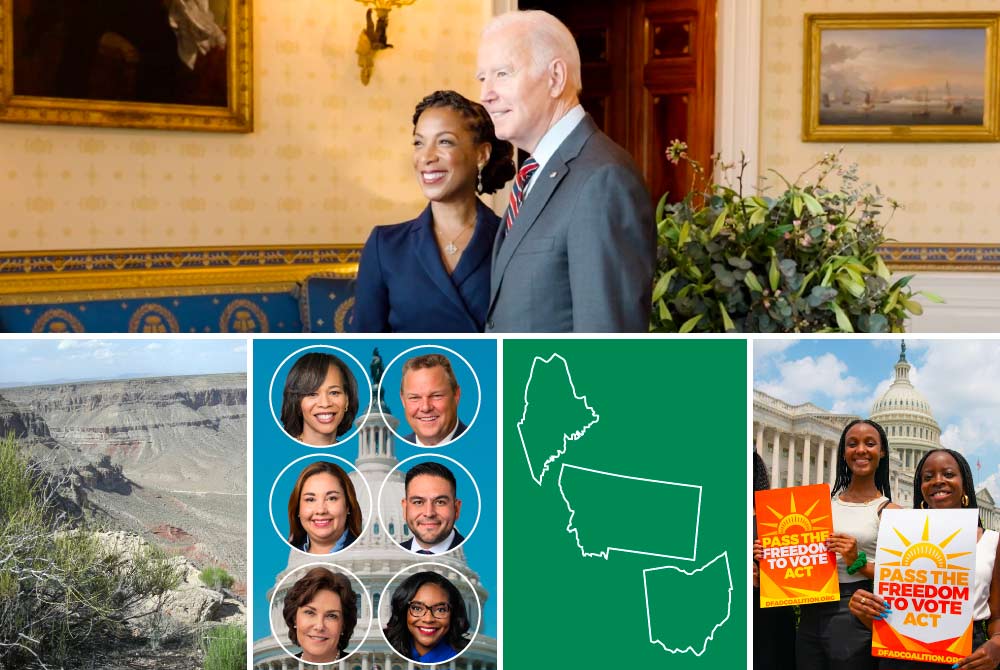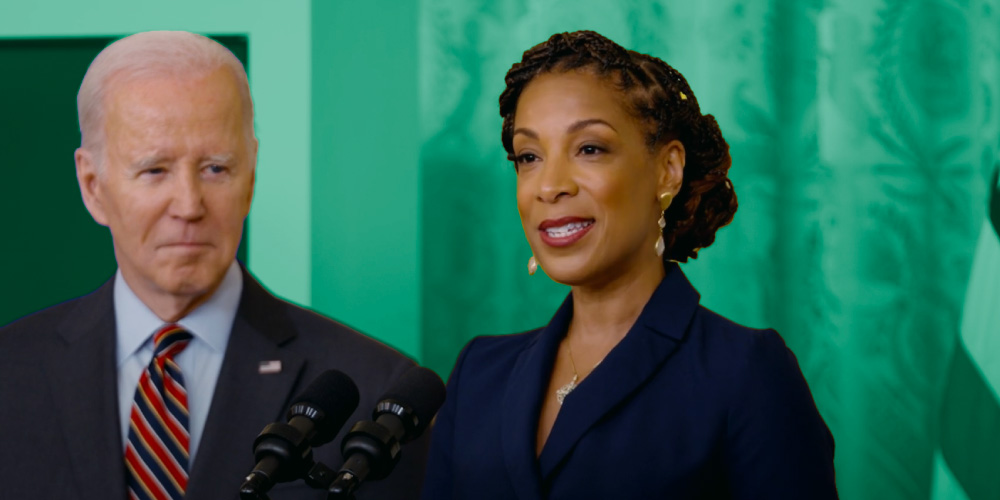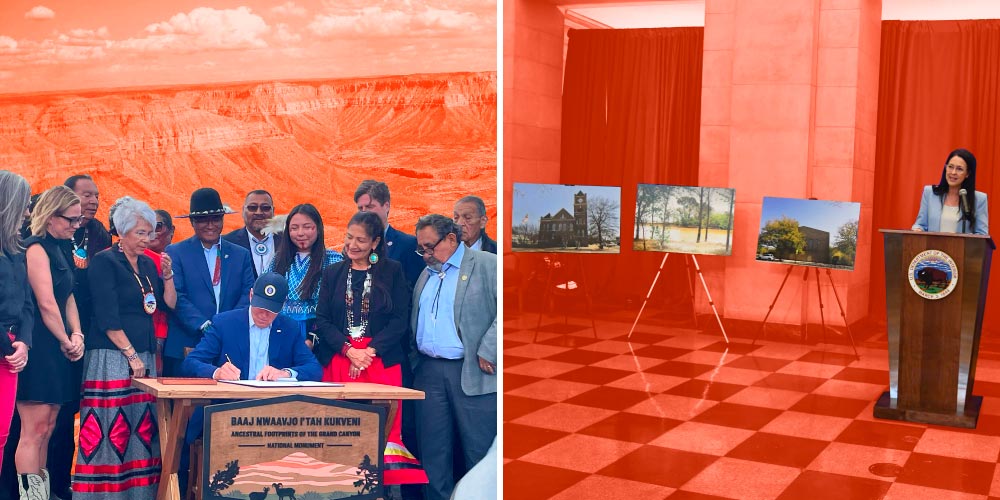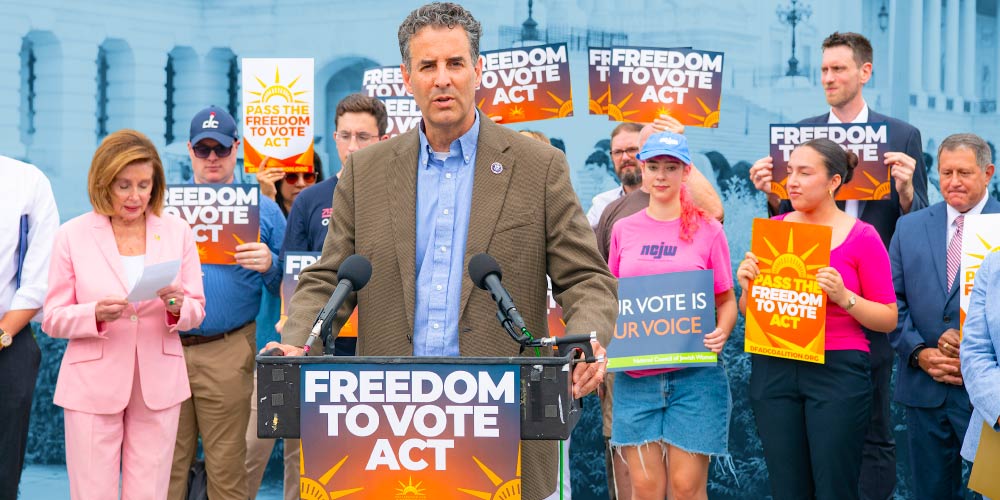Top 5 — April 2024
Apr 29, 2024
 Baaj Nwaavjo I'tah Kukveni — Ancestral Footprints of the Grand Canyon via the U.S. Department of the Interior; Pass the Freedom to Vote Act photo credit: John Nelson, 2023.
Baaj Nwaavjo I'tah Kukveni — Ancestral Footprints of the Grand Canyon via the U.S. Department of the Interior; Pass the Freedom to Vote Act photo credit: John Nelson, 2023.
There’s so much to celebrate this month. In our top story, you’ll meet Natalie King, the founder and CEO of the first African-American woman-owned electric vehicle (EV) charger manufacturer in the world, located in Detroit. In subsequent stories, you’ll learn about the recent protection of one million acres of land surrounding Grand Canyon National Park, endorsements for congressional climate champions, recent victories in Maine, Montana, and Ohio, and the important connections between a healthy democracy and a healthy planet. Read this month’s LCV Top 5 stories.

One year after its passage, the Inflation Reduction Act (IRA) is ushering in a new era of clean energy and countless individual success stories. Take entrepreneur Natalie King, for example. King is the founder and CEO of Dunamis Charge, the first African-American woman-owned electric vehicle (EV) charger manufacturer in the world.
The company is thriving in the heart of Detroit, employs over 135 workers, is slated to produce over 400,000 EV chargers by 2025 — and is fueled by growing demand for EVs thanks to the related tax credits included in the IRA. King credits President Biden’s strong commitment to clean energy and manufacturing for her company’s success, saying, “I believe that clean energy technology gives entrepreneurs a true opportunity to do good for our community while being good at what we do.” Watch a short video featuring King.
Read more stories like King’s.
But it’s not just entrepreneurs like King who are benefiting from the landmark legislation signed into law by President Biden last August. The IRA — the most important action the U.S. has ever taken to address climate change — is moving our country toward an equitable clean energy future and making tangible differences in people lives by:
It took LCV and our movement over a decade of grit, vision, and focused strategy to win passage of the IRA. But our work didn’t stop there. LCV and our 30+ state affiliates are laser-focused on maximizing the benefits of the federal clean energy plan by helping individuals, communities, small businesses, and states understand and make use of more than $369 billion in federal investments available to cut carbon pollution, save consumers money, create jobs, and expand environmental justice. Our plans are well underway and include:
When fully implemented, the federal clean energy plan will bring our nation 80% of the way to reaching our 2030 climate goals. That’s why LCV is also pushing for additional executive and state-level actions that will get us the rest of the way there. At the same time, we must protect these critical clean energy investments from far-right, pro-polluter Congressional Republicans and presidential candidates who are actively trying to turn back the clock on this historic and urgently-needed progress.
As LCV Vice President of Federal Policy Matthew Davis told POLITICO, “We’re living in this moment of tension between a very important victory and also the importance of implementation and getting it right…This is just the start of a race and not at all the end.”
Read more about the benefits of the IRA and the fight to fend off climate tipping points.
See what states are doing to celebrate and implement the IRA.

In recent decades, the U.S. has lost one football field worth of land to development every 30 seconds. This stunning figure (detailed in a Center for American Progress report) is even more compelling when you consider that these losses are largely preventable and that losses in natural lands can contribute to the rise in global temperatures.
Thanks to our supporters, LCV is helping to protect public lands by collaborating with national and local organizations, participating in public meetings and turning out others to do so, placing digital ads to drive thousands of public comments, and advocating with administration officials.
This work has helped encourage the Biden-Harris administration to do more to fulfill its commitment to preserving 30 percent of the nation’s lands and waters by 2030, a goal often referred to as “30×30.” This month, President Biden designated two new monuments, the latest in a series that represents strong conservation efforts as well as successful collaborations with states, Tribes, and private partners.
The most recent designation, Baaj Nwaavjo I’tah Kukveni — Ancestral Footprints of the Grand Canyon, in Arizona, conserves nearly one million acres of public lands around Grand Grand Canyon National Park. The monument protects thousands of cultural and sacred sites important to southwest Tribal Nations, including the Havasupai Tribe, Hopi Tribe, Hualapai Tribe, Kaibab Band of Paiute Indians, Las Vegas Paiute Tribe, Moapa Band of Paiutes, Paiute Indian Tribe of Utah, Navajo Nation, San Juan Southern Paiute Tribe, Yavapai-Apache Nation, Pueblo of Zuni, and the Colorado River Indian Tribes.
The monument includes deep canyons and sweeping plateaus, habitats ranging from sagebrush to savanna, and a wide range of wildlife, including bighorn sheep, peregrine falcons, bald eagles, and songbirds. It also includes vital sources of clean drinking water that feed into the Colorado River as well as outstanding opportunities for outdoor recreation and related benefits to the regional economy. Read LCV and Chispa AZ’s joint response to this monument designation.
In late July, the president designated the Emmett Till and Mamie Till-Mobley National Monument, in Illinois and Mississippi, as part of the administration’s commitment to advancing civil rights and telling a more complete American story. The National Park Service monument will shine light on the events surrounding Emmett Till’s murder within the context of the U.S. civil rights movement and the broader story of Black oppression, survival, and bravery.
LCV President Gene Karpinski and Illinois Environmental Council (IEC) Executive Director Jen Walling reflected on the designation in a joint statement, saying, “The brutal murder of Emmett Till in 1955, and the courage and strength of [his mother] Mamie Till-Mobley to share her loss with the world, helped expose the racism in America and inspire movements for justice. Their legacy, and President Biden’s preservation of the sites that tell their stories, stand in stark contrast with the current politicians who attempt to erase the country’s history of racism instead of learning from it.” Read the joint response from LCV and IEC.
In addition to the monuments detailed above, President Biden has designated three others to date, including Camp Hale in Colorado, Avi Kwa Ame in Nevada, and Castner Range in Texas.
Elections have consequences. That’s why LCV Action Fund works to help elect pro-environment candidates, including helping to elect and reelect 90 U.S. senators and 450 members of the U.S. House of Representatives since 1990. Over the last several years, LCV Action Fund’s efforts have also helped elevate climate change, clean energy, environmental justice, and democracy as critical issues in key elections.
LCV Action Fund recently announced its first round of 2024 congressional endorsements, including 85 incumbent climate and democracy champions and five new candidates in competitive districts. With this summer’s deadly heat and raging fires, it’s clearer than ever that we must elect and reelect leaders who will fight for equitable and effective climate solutions at the scale and pace required. See the candidates who have received LCV Action Fund endorsements to date.
There are a lot of things that make LCV unique in the environmental movement, one of which is our ability to quickly mobilize the public in response to rapidly changing policy and advocacy needs. This has been critical to our success in recent years, helping us hold elected leaders accountable to advance and defend strong policies on climate, clean energy, democracy, and more. The Conservation Voters Movement (CVM) is at the center of this success.
LCV supports and amplifies the work of our 30+ state affiliates, including by facilitating close collaboration and sharing of expertise and resources across the CVM. Three state-level victories in recent weeks illustrate the power of the CVM:
Thanks to recently passed legislation, Maine is slated to develop three gigawatts of offshore wind by 2024 — enough power to eventually provide for nearly half of the state’s energy needs while advancing its goal of 100 percent clean energy by 2040. This latest victory for offshore wind is the result of a winning coalition of labor and environmental groups and provides a national model for the clean energy transition.
LCV’s partnership with Maine Conservation Voters (MCV) played a key role in enabling this victory. To get this bill across the finish line, MCV ran an extensive digital ad campaign, held regular lunch and learn public education virtual events, drove turnout to hearings and lobby days, garnered over a thousand constituent messages to decision-makers, and built powerful relationships with labor partners. Read more about Maine’s offshore wind legislation.
A Montana judge recently sided with youth activists and ruled that a stable climate falls under the right to a “clean and healthful environment” as guaranteed in the state’s constitution. The youth plaintiffs, ranging in age from 5 to 22, sued the state over legislation that prevents state agencies from considering climate impacts when permitting fossil fuel development. This is an outstanding example of the importance of courts in addressing climate change and adds to the body of related legal decisions worldwide.
Our Montana state affiliate played an active role in the public education campaign on this topic. Read more about the Montana court decision.
Issue 1 was an Ohio ballot initiative that would have taken power away from Ohioans by increasing the proportion of votes required to amend the state’s constitution from 50 to 60 percent and making it much harder to obtain the signatures needed to introduce future ballot measures. This victory in Ohio has implications for other potential future state ballot initiatives related to gerrymandering, voting rights, reproductive rights, the minimum wage, and the environment.
The Ohio Environmental Council Action Fund ran a large campaign to help defeat Issue 1, which included voter registration and get-out-the-vote efforts, print and digital outreach, rallies in major cities, a high-profile event with Ohio House Minority Leader Allison Russo, as well as digital and radio ads that yielded more than half a million impressions. Read more about the stakes of defeating Issue 1.
The impact of CVM victories like these has a multiplier effect. As states make progress on climate action and democracy issues, their examples influence what happens in cities, other states, and at the federal level. That’s why LCV continues to invest in our state affiliates, providing millions of dollars in grant support each year, along with training, advice, and coalition-building opportunities.

At LCV, we understand that our nation’s biggest environmental challenges require political solutions. That’s why, along with our state affiliates, we focus on building a strong democracy to help ensure a healthy environment. With mounting threats to democratic access and the stark reminders of the need for climate action in recent months, this combined work has never been more important.
In 2023 alone, more than 300 restrictive voting bills have been proposed in 45 states, building on the wave of similar bills passed in recent years.
As part of our ongoing advocacy for national protection of voting rights, LCV has actively supported passage of the Freedom to Vote Act since 2019. This summer, we joined a broad coalition of climate and environmental groups urging Congress to pass this critical legislation. The bill was recently reintroduced by Representative Sarbanes (MD-3) and Senator Klobuchar (MN) and would set basic federal standards so all Americans can cast their ballots in the way that works best for them. Specifically, the legislation aims to protect and increase safe, secure, and equitable voting access, especially for those who have historically dealt with the highest barriers to voting, including communities of color, people with disabilities, and young people.
As part of our ongoing efforts to keep these issues top of mind, LCV recently engaged members of Congress in a Q&A session about how legislation like this can help protect access to the ballot box — and what they’re doing to maintain and protect a strong, robust democracy for all. Read responses from members of Congress during the voting rights Q&A.
The Freedom to Vote Act will ban partisan gerrymandering in congressional elections, improve our broken campaign finance system, and combat partisan election subversion — all of which are critical to allowing voters to freely and fairly elect representatives who will take meaningful action on climate change. Help protect voting rights. Urge Congress to pass the Freedom to Vote Act today.
Send an Email Now